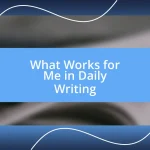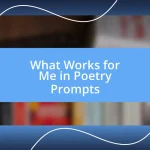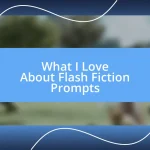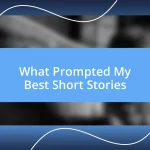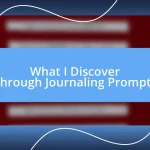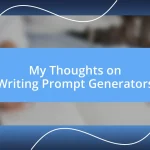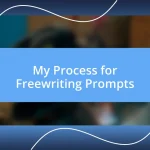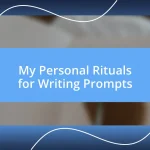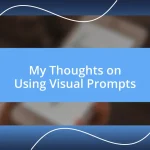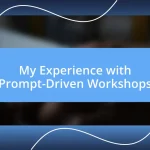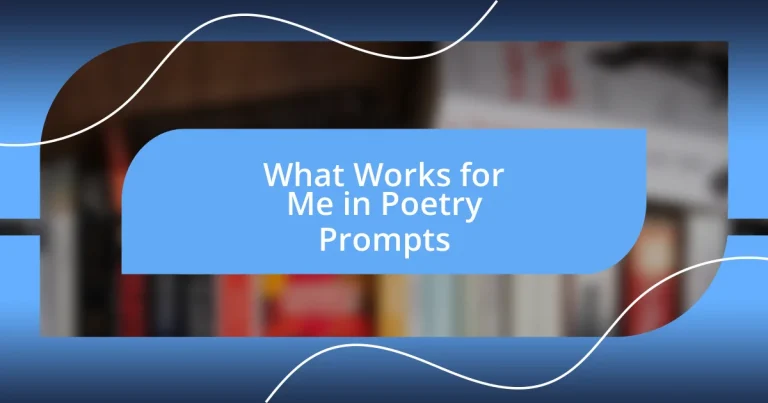Key takeaways:
- Poetry prompts spark creativity and foster self-discovery, enabling writers to explore thoughts and emotions they might otherwise avoid.
- Different types of prompts—thematic, visual, and structured—encourage diverse expression and technical growth in writing.
- Overcoming writer’s block can be achieved by changing environments, practicing free writing, and collaborating with fellow writers for inspiration.
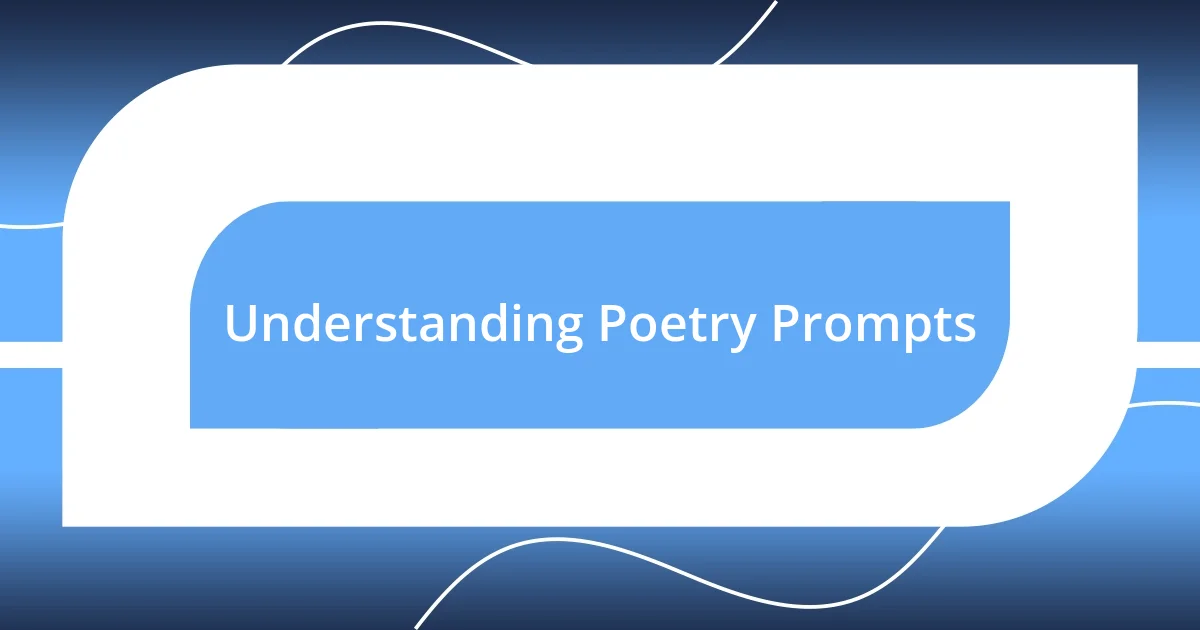
Understanding Poetry Prompts
Poetry prompts serve as creative sparks, guiding writers to explore thoughts and emotions they might not otherwise confront. I remember the first time I encountered a prompt that asked me to describe a memory associated with a particular scent. It was a simple instruction, yet it opened a floodgate of nostalgia, taking me back to my grandmother’s kitchen filled with the smell of fresh-baked cookies.
Often, prompts can feel like a gentle nudge or, at times, an outright challenge. Have you ever felt stuck, staring at a blank page, longing for inspiration? In my experience, a well-crafted prompt can break down those barriers. For instance, when prompted to write about “a door that leads to another world,” I found myself delving into themes of escape and transformation, which deepened my understanding of my own desires.
Importantly, engaging with poetry prompts is not merely about producing verses; it’s about fostering self-discovery. I’ve found that some of my most profound lines emerged from prompts that pushed me to confront uncomfortable truths. They act like mirrors, reflecting parts of ourselves we might shy away from exploring. This is the beauty of prompts; they invite us to dance between creativity and introspection.
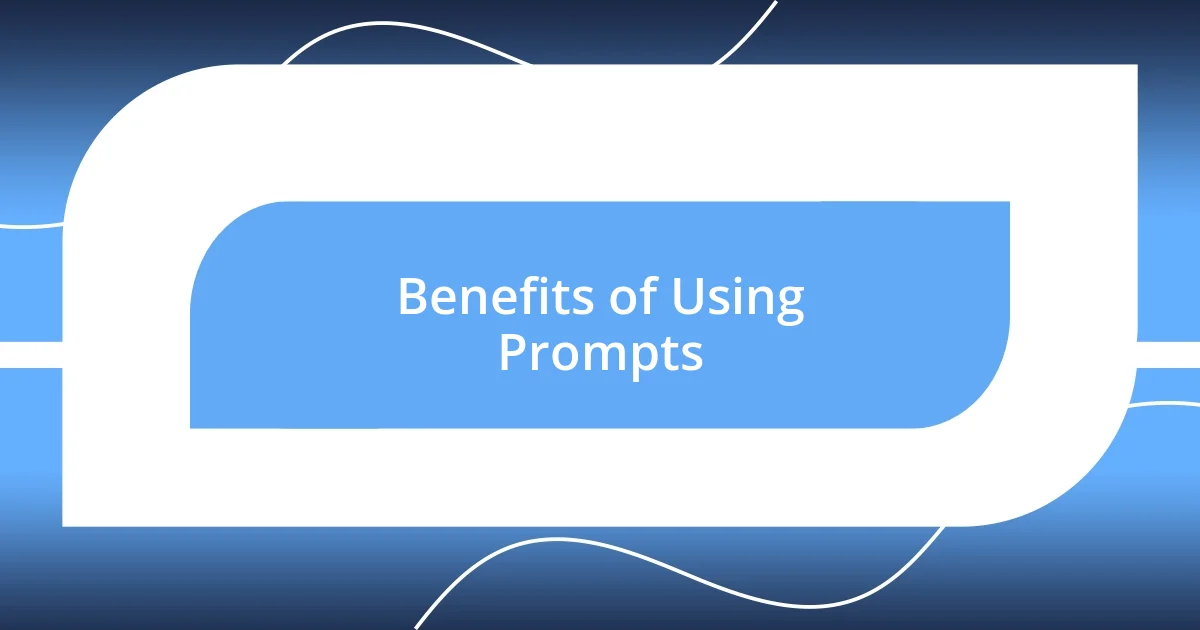
Benefits of Using Prompts
Using poetry prompts offers a plethora of benefits that can enhance our creativity and deepen self-exploration. When I first started using prompts, I noticed a refreshing shift in my writing. They pushed me outside my comfort zone, challenging me to explore themes and emotions I had previously ignored. For example, a simple prompt about “a childhood dream” led me to revisit old aspirations, and I found unexpected inspiration in those memories.
- They alleviate writer’s block by providing instant direction.
- Prompts can unlock new themes and subjects that resonate on a personal level.
- Engaging with prompts fosters emotional growth and self-discovery.
- They encourage experimentation with various styles and formats.
- Using a prompt can lead to surprising and unique poetic expressions.
Each prompt feels like a little gift, revealing wonders I didn’t even know existed within me.
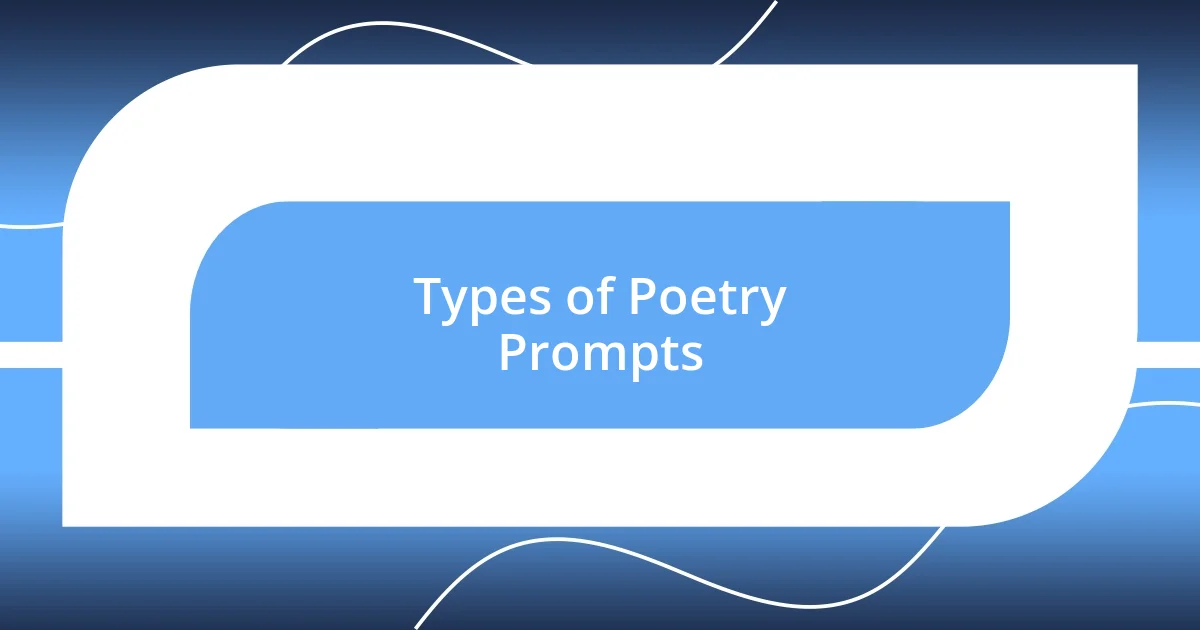
Types of Poetry Prompts
Poetry prompts come in various forms, each designed to spark creativity in unique ways. I’ve had great success with thematic prompts, where the focus is on exploring a specific subject, such as “identity” or “nature.” These themes push me to reflect deeply on my experiences, often leading to unexpected connections in my writing. Different themes can invoke a range of emotions; sometimes I feel exhilarated, and other times, I find myself in a more contemplative mood.
Another popular type of prompt is the visual prompt, where a picture or piece of art inspires the poem. I remember finding a stunning photograph of a stormy sea, which stirred feelings of chaos and resilience in me. When I wrote about it, I never anticipated that I could weave the imagery into a narrative about overcoming life’s challenges. Visual prompts are powerful because they engage both the mind and the heart, resulting in a tangible output of emotions we often hold inside.
Finally, structured prompts, like “write a poem using an ABAB rhyme scheme” or “incorporate three sensory details,” serve to sharpen our technical skills while fostering creativity. I can’t tell you how many times a structured prompt has pushed me beyond my habitual writing style. It forces me to experiment and take risks, leading to surprising results that often feel both fresh and authentic. Each type of prompt offers a different pathway to creativity, and exploring them all has transformed my writing practice.
| Type of Prompt | Description |
|---|---|
| Thematic Prompts | Focus on specific subjects, encouraging deep reflection and emotional exploration. |
| Visual Prompts | Based on images or art that evoke emotions and narratives, fostering creativity through imagery. |
| Structured Prompts | Involve particular forms or techniques, pushing technical growth and experimentation. |
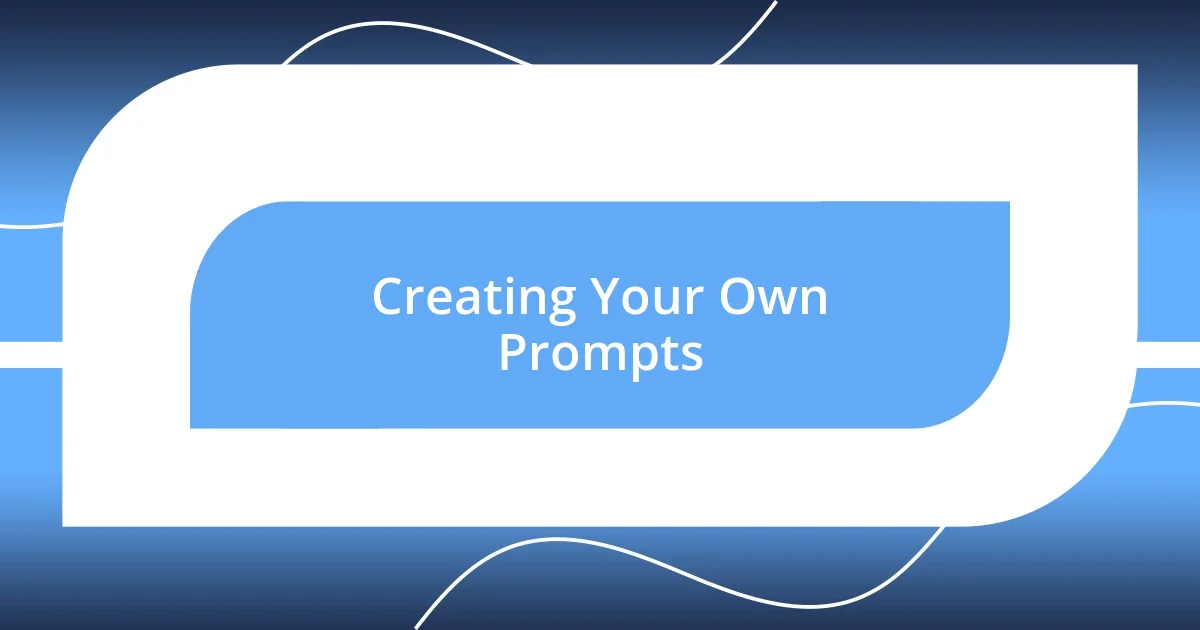
Creating Your Own Prompts
Creating your own prompts can be an exhilarating exercise that taps into your unique experiences and emotions. When I sit down to craft a prompt, I often start by reflecting on a moment that stirred something deep within me—like that time I watched a sunset that reminded me of lost love. Asking questions like “What memory does this scene evoke?” helps me frame a prompt that feels personal and meaningful.
One method I really enjoy is blending different elements. For instance, I might write a prompt that combines a specific setting, like “a deserted carnival,” with an emotional theme, such as “fear of abandonment.” This combination sparks my imagination and invites me to explore a rich tapestry of feelings and imagery. I encourage you to think about what experiences resonate with you. What elements from your life or surroundings could become a creative springboard for a prompt?
As you dive into crafting prompts, don’t be afraid to let randomness play a role. I once grabbed words from a fortune cookie—“dream,” “storm,” and “journey”—to create an unexpected and delightful prompt. I was surprised at how those seemingly unrelated words wove together into a powerful poem about resilience and hope. The unpredictability can lead to some of the most transformative writing, encouraging you to think outside the box. What could you discover if you opened your creativity to chance?
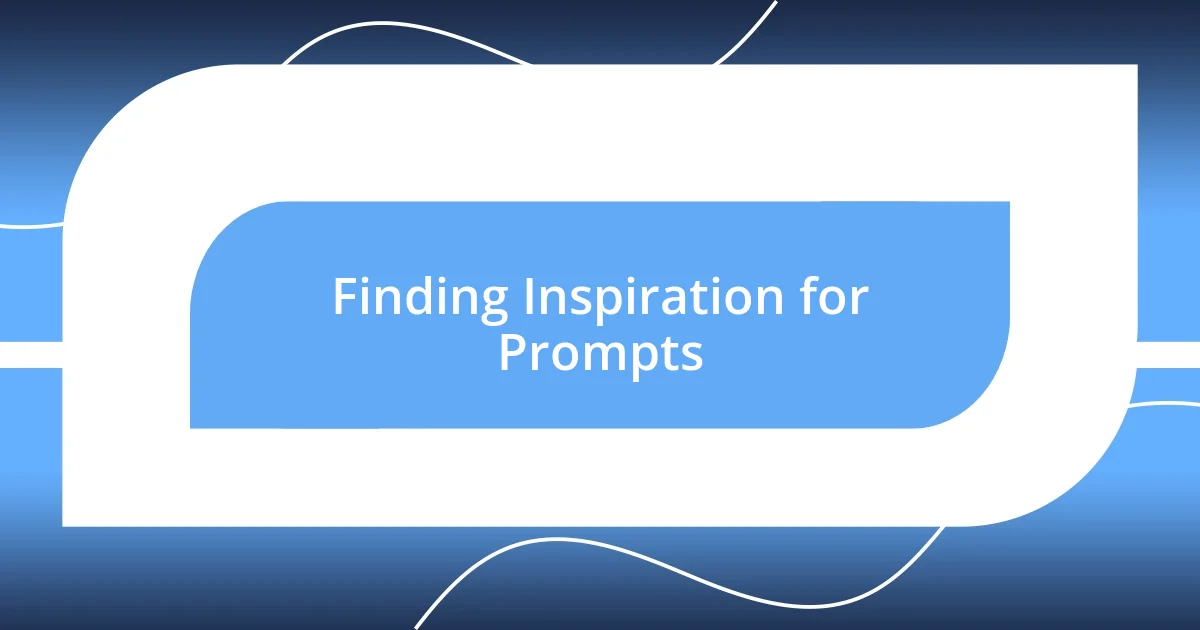
Finding Inspiration for Prompts
Finding inspiration for poetry prompts can often come from the most unexpected places. I remember sitting in a café, surrounded by the murmur of conversation and the scent of fresh coffee, when a phrase caught my ear—a snippet of someone’s story about chasing dreams. Instantly, I felt compelled to jot down a prompt based on that moment. It made me think: what stories are swirling around us daily that could ignite our creativity?
Nature has also been a powerful source of inspiration for me. On one of my evening walks, I stumbled upon a pine tree covered in frost that glimmered like diamonds in the fading light. I found myself enchanted by its beauty and resilience, prompting me to write a poem about strength in adversity. This experience taught me that sometimes a simple observation can lead to profound insights—what’s out there in your environment waiting to spark your imagination?
Another approach I cherish is revisiting memories, especially those that tug at my heartstrings. Reflecting on moments of joy or pain can uncover rich themes for poetry. For instance, recalling a childhood birthday party made me confront a mix of nostalgia and longing. This led to a prompt centered around the idea of fleeting moments, encouraging me to explore how those times shape who we are. What memories could you delve into that might reveal deeper emotional truths in your writing?

Tips for Overcoming Writer’s Block
Writer’s block can be incredibly frustrating, but I’ve found a few tricks that can help shake things loose. One of my go-to strategies is changing my environment. I remember one day, when I was stuck, I decided to write in the park instead of my usual spot at home. Just being around the rustling leaves and the distant laughter of children sparked new ideas that I hadn’t anticipated. Have you ever noticed how a fresh setting can shift your perspective and invite creativity?
Another technique that works wonders for me is free writing. I often set a timer for ten minutes and let my thoughts flow without judging the quality. It’s amazing how this exercise can clear away the cobwebs of hesitation. I once stumbled upon a poem about a forgotten playground just by jotting down whatever came to mind, leading me to unexpected places in my own memories. How often do you let your thoughts run wild without the pressure to create something perfect?
Lastly, connecting with fellow writers is a fantastic way to reignite your passion. I remember attending a workshop where we were all tasked with sharing our struggles. Hearing others discuss their hurdles made me realize I wasn’t alone, and we brainstormed prompts together, fueling each other’s creativity. Isn’t it interesting how collaboration can lead to breakthroughs that solitary writing often lacks?
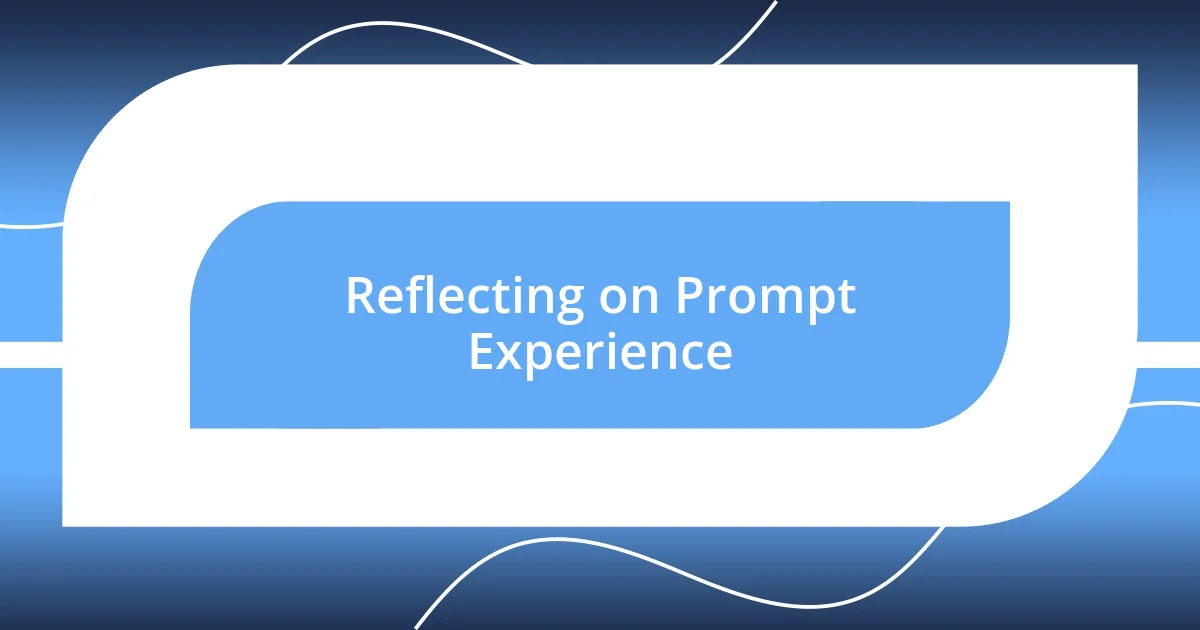
Reflecting on Prompt Experience
Reflecting on my experiences with prompts often reveals deeper layers of my creative process. I’ll never forget a day when I was inspired by a simple weather report—a chance of rain that felt symbolic of renewal. As I wrote, I found myself contemplating how storms can often lead to growth, and that very prompt opened my heart to write about resilience in the face of challenges. Have you ever had a moment where a mundane detail transformed into a profound theme for your own writing?
I’ve learned that the emotional weight behind a prompt can turn a few words into a powerful catalyst for expression. Once, I jotted down “a forgotten letter” as a prompt, recalling my grandmother’s old trunk filled with memories. As I began to write, the mix of joy and sorrow washed over me, allowing me to explore the complexities of love and loss. How often do we allow an emotion to guide us into uncharted poetic territory?
Sometimes, looking back at my past prompts gives me a fresh perspective on my growth as a writer. I remember revisiting a prompt about “strangers’ stories” that I wrote years ago. It amazed me how those early attempts at capturing fleeting moments had evolved into a deeper understanding of connection and empathy in my work. Isn’t it intriguing to see how our initial sparks of inspiration can shape the stories we choose to tell as we mature?
